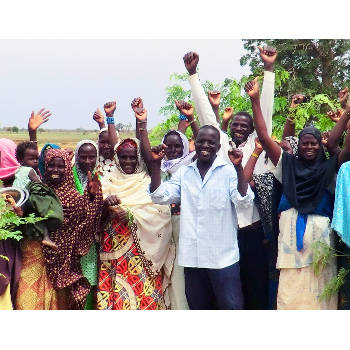 (WASHINGTON, DC) –The National Cooperative Business Association CLUSA International (NCBA CLUSA) is pleased to announce that it has signed a five-year, $70 million cooperative agreement with the United States Agency for International Development (USAID) to bring resilience and economic growth to individuals and families in the Sahel regions of Niger and Burkina Faso.
(WASHINGTON, DC) –The National Cooperative Business Association CLUSA International (NCBA CLUSA) is pleased to announce that it has signed a five-year, $70 million cooperative agreement with the United States Agency for International Development (USAID) to bring resilience and economic growth to individuals and families in the Sahel regions of Niger and Burkina Faso.
This project is known as Resilience and Economic Growth in Sahel – Enhanced Resilience (REGIS-ER) and will benefit more than 2 million vulnerable people through NCBA CLUSA’s integrated approach, which will address the diverse structural causes of chronic food insecurity and nutritional vulnerability in the Sahel region of West Africa.
REGIS-ER builds on a number of NCBA CLUSA’s sustainable development programs in both countries that have modeled approaches to resilience programming—most recently, the ARZIKI project, focusing on food security, natural resources management, and climate change adaptation; and the moringa value chain project working with women on cultivating and marketing this nutrient-rich plant. NCBA CLUSA started working in Niger in 1985 and Burkina Faso in 1993, establishing community-based health services, developing effective rural organizations, linking farmers to input suppliers and buyers, promoting strong and dynamic markets, and improving household incomes.
“This fully integrated project will address resilience at its core and build the foundation for sustainable and scalable economic growth for the people of the Sahel,” says Mike Beall, President and CEO of NCBA CLUSA. “Our unique and highly successful grassroots, principled approach has been highly effective over the years and positions NCBA CLUSA perfectly to partner with the people of Niger and Burkina Faso as they increase their own quality of life.”
One of the poorest countries in the world, 86% of Niger’s rural population lives under the poverty level. In 2005, and then again in 2011, the country experienced a severe but localized food security crisis, triggered by drought. NCBA CLUSA’s new effort there is based on the premise that bolstering food security requires a holistic approach, which must simultaneously improve agricultural production, manage and sustain the natural resource base, increase farmers’ revenues, and increase access to water and basic public health services.
Similarly, unreliable rainfall and frequent droughts have negatively affected Burkina Faso’s agricultural harvest, causing food shortages across the country. A disaster was declared in March 2012, due to dry spells and rising food prices. Compounding these issues, Burkina Faso is also faced with widespread malaria and malnutrition, with much of the population having little or no access to basic health care, clean drinking water or appropriate sanitary facilities.
Over the next five years, this project will result in a 20% reduction in the depth and prevalence of poverty amongst poor households and a 20% reduction in the prevalence of severely and moderately hungry households. More than 1.5 million children under five will have measurable improvement in their nutrition levels.
The economic growth component aims to achieve a $12 million (USD) increase in off-farm income, while increasing the assets of vulnerable households by $10 million. More than 2 million hectares will be improved through the management of natural resources and development of 12,400 hectares of new irrigated land using practices. This project will also increase the capacity of 400,000 people to adapt to the impacts of climate variability and cope with a major crisis.


